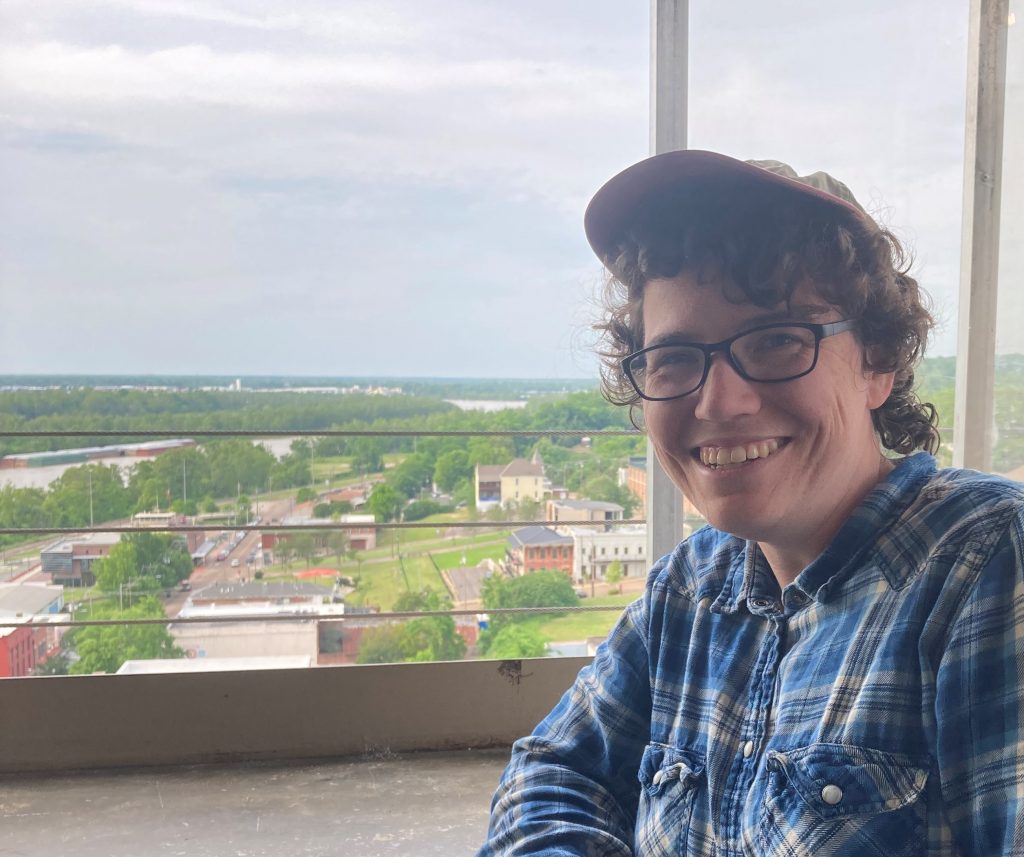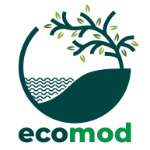Dr. Emily Russ participated in work regarding Beneficial Use of Dredged Materials (BUDM), along with researchers from the Portland District. This new publication uses historic data of local species, including the Streaked Horned Lark, as an ecological indicator to inform stakeholders of historical trends at dredging sites.
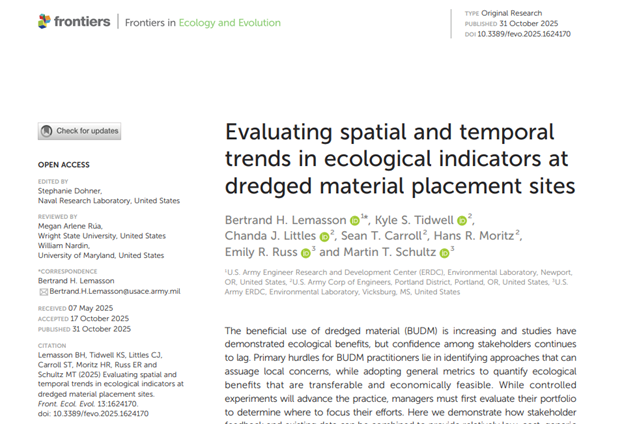
NEXT GENERATION MODELING SEMINAR
Kiara Cushway of ERDC presented sampling research done through NextGen. Accurate and reliable information about populations is essential for informed conservation and management of threatened and endangered species like freshwater mussels. She introduced Survey Analysis for Monitoring Populations (SAMPL), a novel agent-based model designed to simulate changes in population density estimates based on different sampling techniques. She showcased how different sampling regimes and spatial distributions can influence population estimates and describe the impacts those inferences can have on long-term species management. You can watch the recording here.
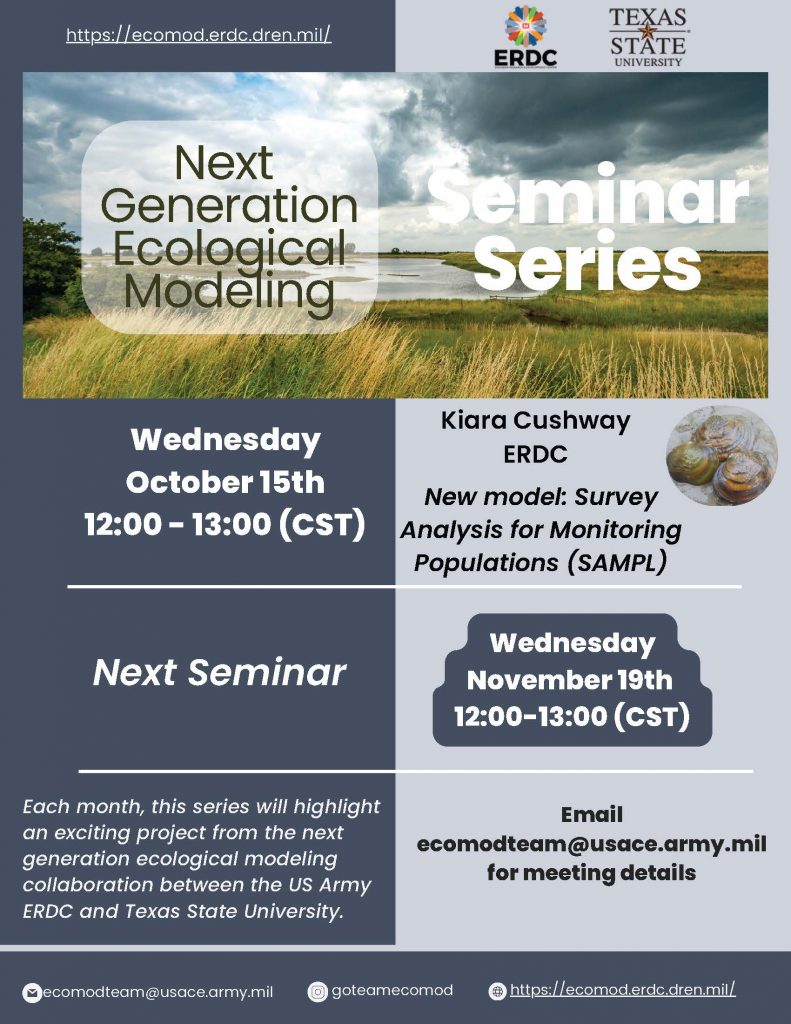
Our NextGen partner Utah State University has been working on utilizing 3D-printed mussels in ecosystem restoration. Megan DiNicola is leading field studies to chart how these printed mussels respond to reintroduction, including tracking mobilization, displacement, and resettlement. This data will inform future restoration efforts.
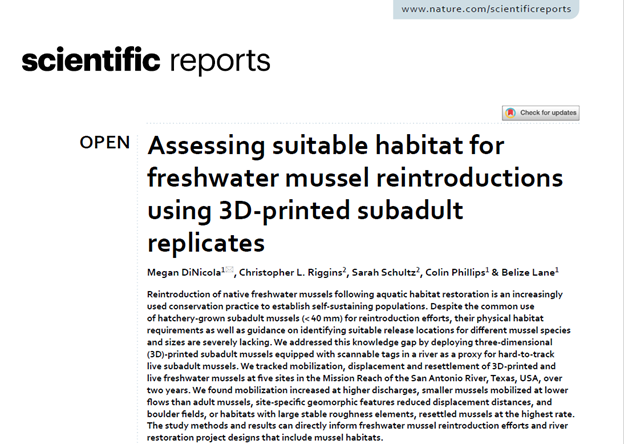
NEXT GENERATION MODELING SEMINAR
Garrett Menichino is focused on quantifying and restoring the under-researched hyporheic zone (HZ). The existing stream frameworks used in ecological restoration planning do not include HZs, but he has created a modeling tool to quantify HZ metrics- the Hyporheic Exchange (HYPE) tool! You can watch the recording here.
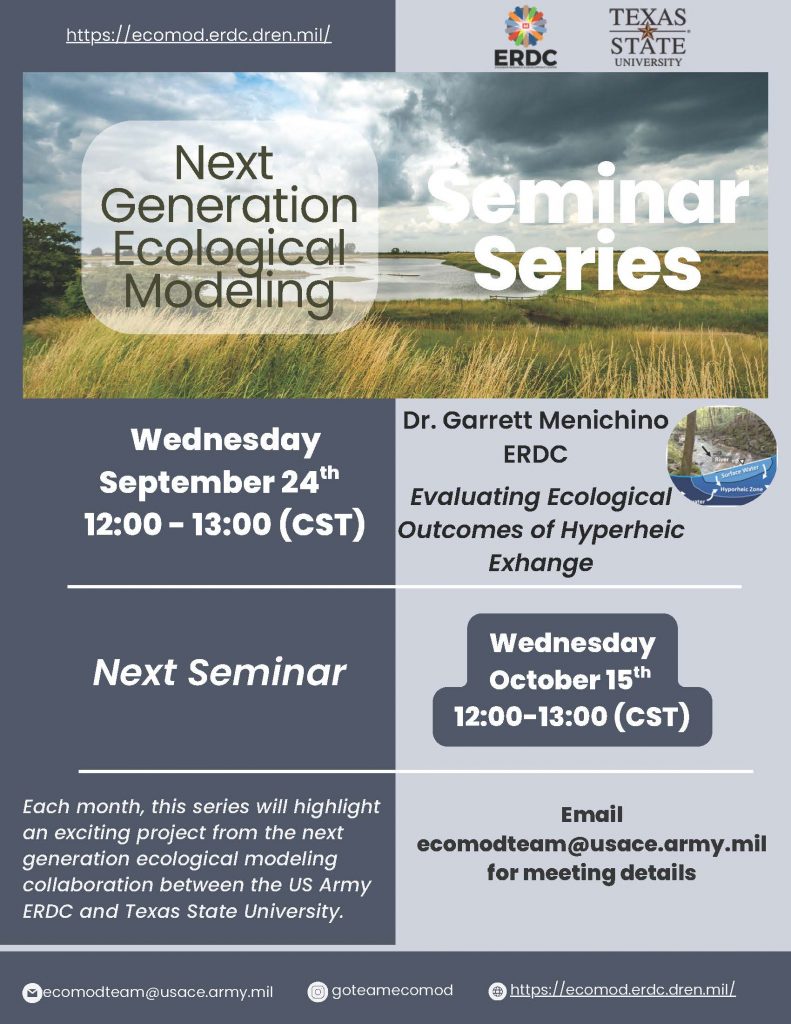
As part of the NextGen effort, Kiara Cushway and Iris Foxfoot delved into the sampling methods of mussels. They created the SAMPL model to evaluate various survey methodologies, in order to determine the most effective way to achieve research goals. Read about their work here.
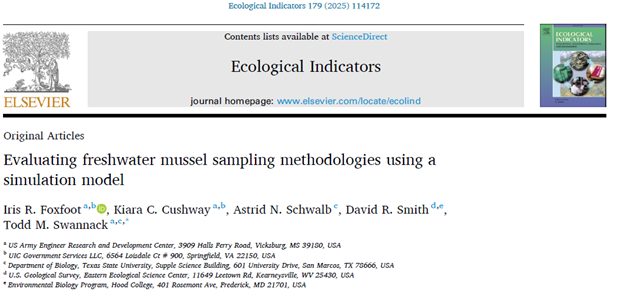
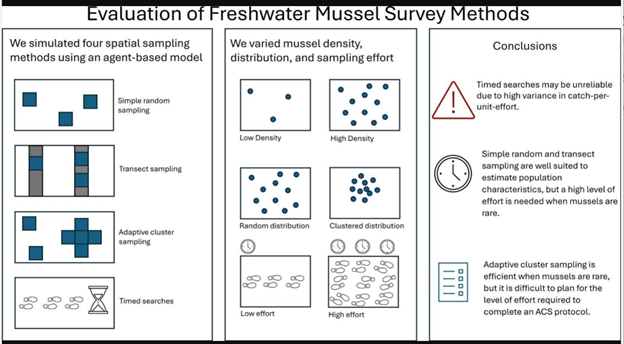
NEXT GENERATION MODELING SEMINAR
Dr. Todd Swannack discussed the products of the first two phases of the NextGen effort including datasets, publications, and student development. We have over 500 unique deliverables that highlight the success of this effort and look forward to synthesizing this data in Phase III. You can watch the recording here.
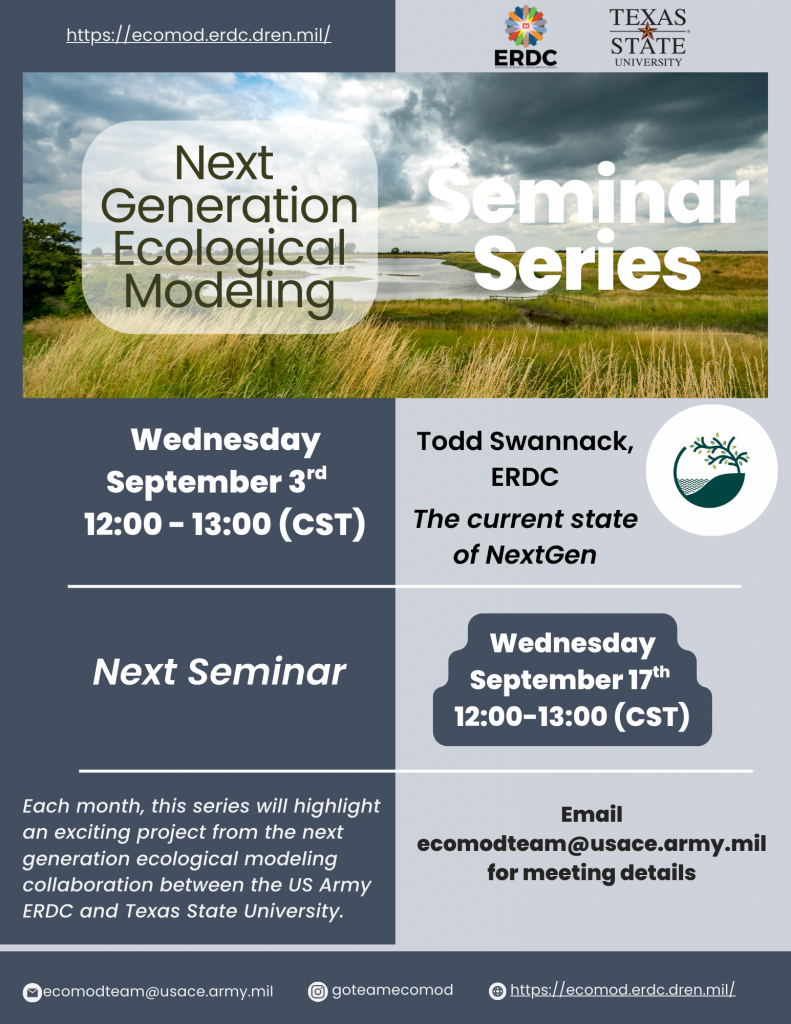
ERDC’s Aubrey Harris and Kiara Cushway have been working on hydraulic models as part of our NextGen effort. In this Tech Note, they discuss the importance of integrating engineering and ecological principles within these models to better assist with restoration planning.
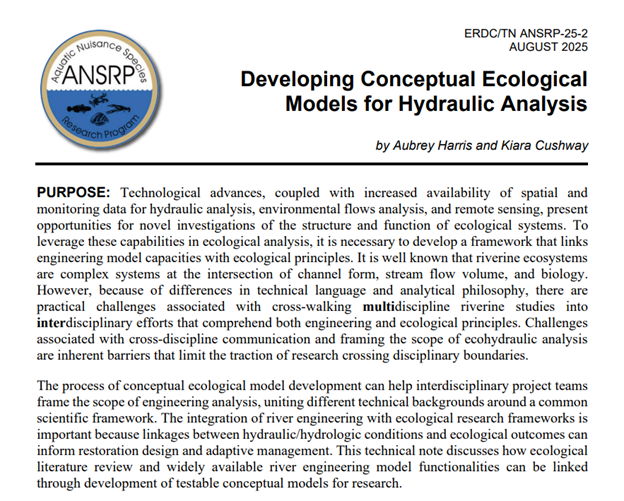
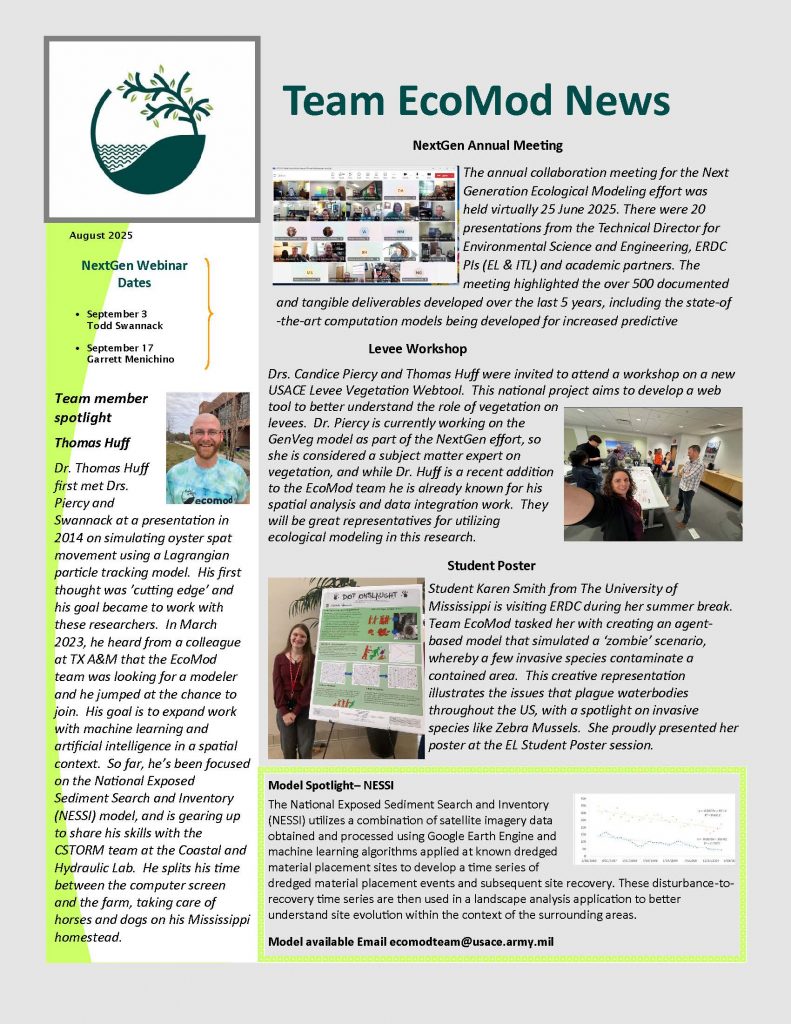
EcoMod’s Drs. Piercy, Huff, and Russ have a project studying coastal wetlands functional assessments and, along with their collaborators, have created a story map illustrating their work for the Dredging Operations Environmental Research (DOER) program. As the project continues, they will work on a metrics calculator to assist in beneficial use planning.
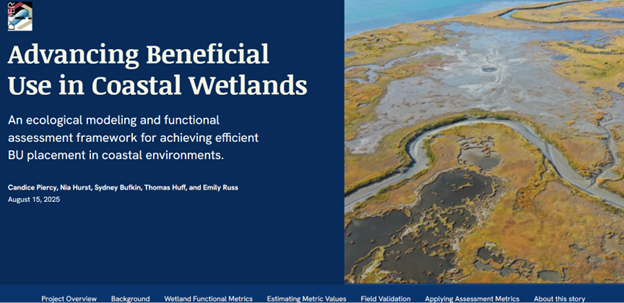
NEXT GENERATION MODELING SEMINAR
Our July seminar was presented by Sam Wiest of ERDC. Her abstract states: River temperature plays a critical role in shaping aquatic ecosystems, yet it is often underutilized in ecological modeling and restoration planning. This webinar provides guidance on the application of thermal modeling approaches with a focus on integrating temperature dynamics into ecological analysis. Additionally, a case study on the Upper San Saba River highlights how a 1D hydraulic model could simulate stream temperature and support habitat assessments for freshwater mussels. You can watch the recording here.
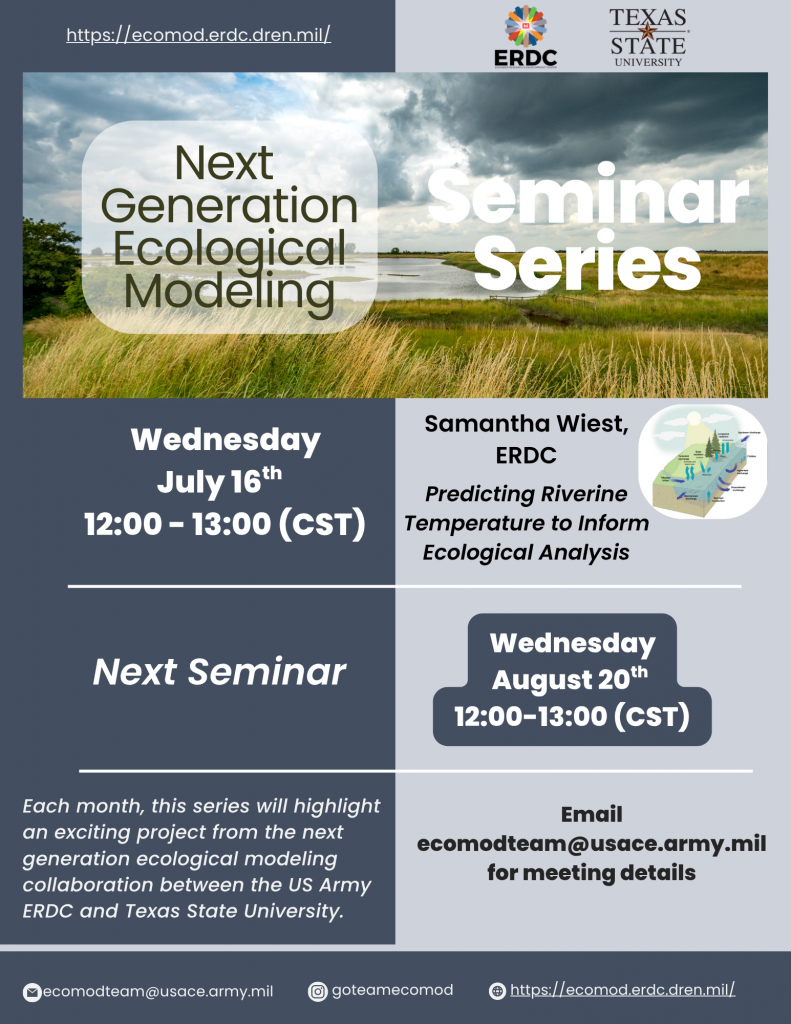
Check out Dr. Emily Russ’ work on submerged aquatic vegetation (SAV) within our Next Generation Ecological Modeling effort. She has been working with the Lewisville Aquatic Ecosystem Research Facility (LAERF), a USACE research center in Texas, for data collection to inform her SAV modeling. She also spoke about this project at our April NextGen webinar; you can find a recording of her presentation here.
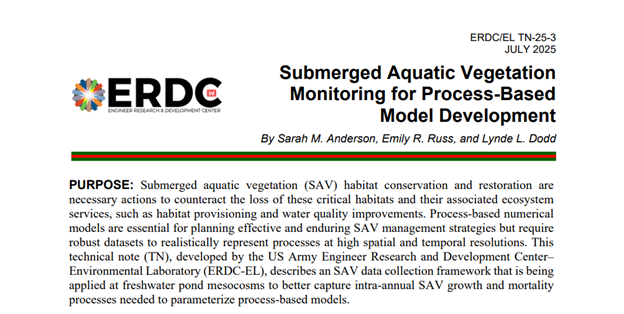
NEXT GENERATION MODELING SEMINAR
Texas State University PhD student Miranda Sams presented a ‘seasonal model’ for scientific translators, people to actively connects ecological research, education, and community engagement across disciplines and sectors. The collaboration is an essential tenet of the Next Generation Ecological Modeling program, and we are excited to see this study embraced by students who will continue this focus in the future. Check out the recording and presentation here.
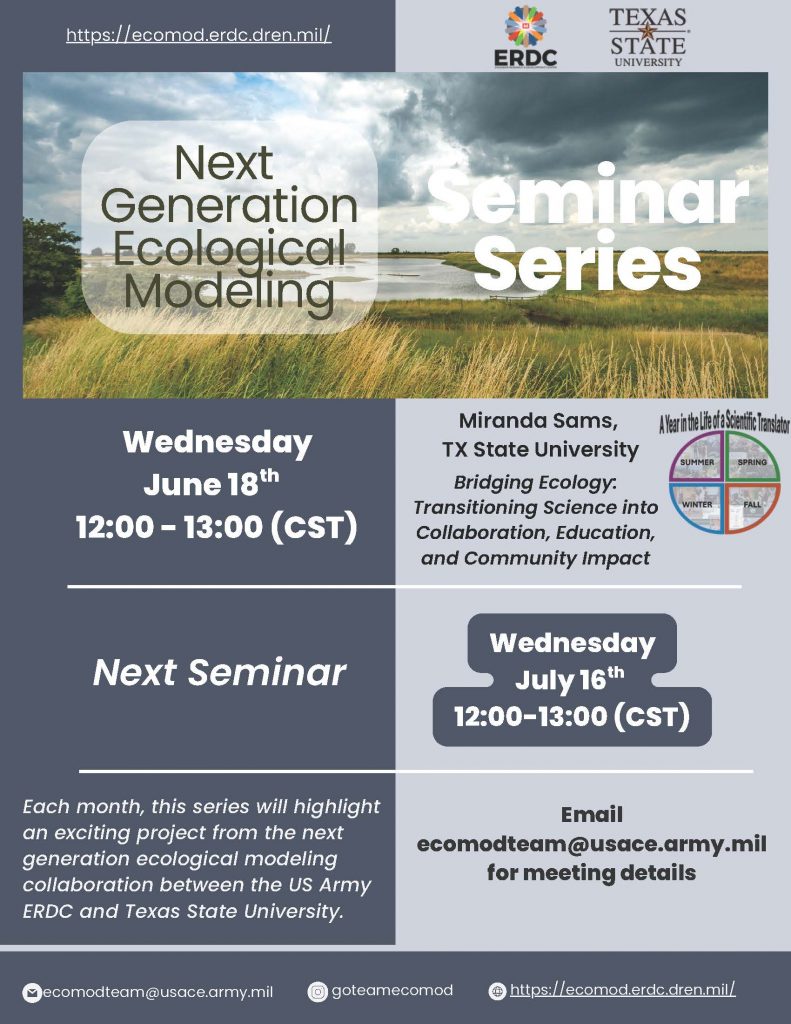
Check out the new publication from Mississippi State University, a product of the Next Generation Ecological Modeling program. Our collaboration with Mississippi State and other universities provides data collection to inform future ecological modeling work. The article discusses measuring and analyzing wetland biomass.
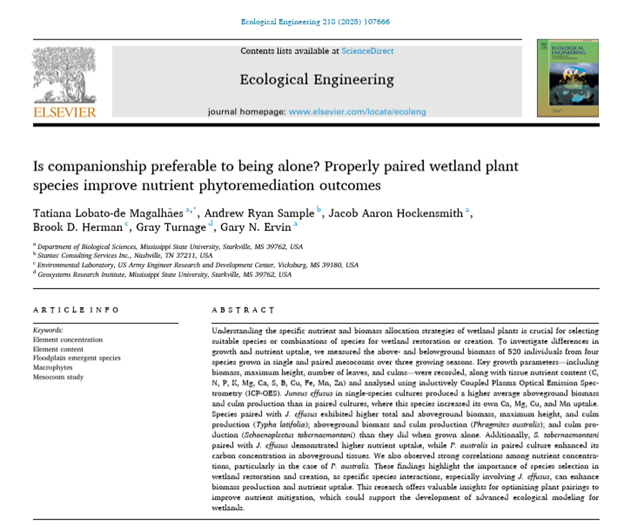
NEXT GENERATION MODELING SEMINAR
We will be celebrating five years of Next Generation Ecological Modeling! Dr. Todd Swannack will be providing a history, highlighting accomplishments, and looking towards the future.

NEXT GENERATION MODELING SEMINAR
ERDC’s Dr. Emily Russ gave an overview of her work on submerged aquatic vegetation (SAV) data collection for a generalized vegetation model. She highlighted her work at Lewisville Aquatic Ecosystem Research Facility (LAERF) to gather SAV data and how to analyze and parameterize the findings for input into the GenVeg model. Click here for the seminar recording.
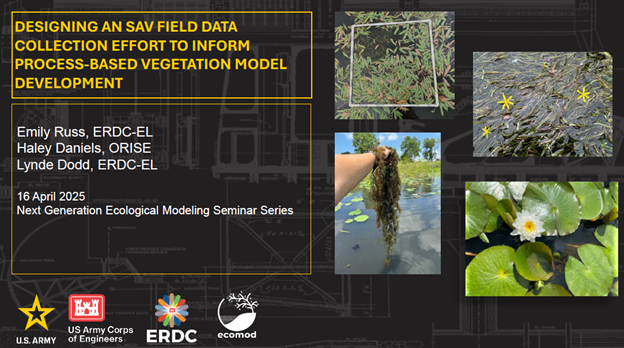
NEXT GENERATION MODELING SEMINAR
ERDC’s Dr. Aubrey Harris and Kiara Cushway previewed their journey from hydraulic conceptual model to HEC-RAS tool using case studies to validate and gather data. Their upcoming tech note will detail this process. Stay tuned! Click here for the seminar recording.
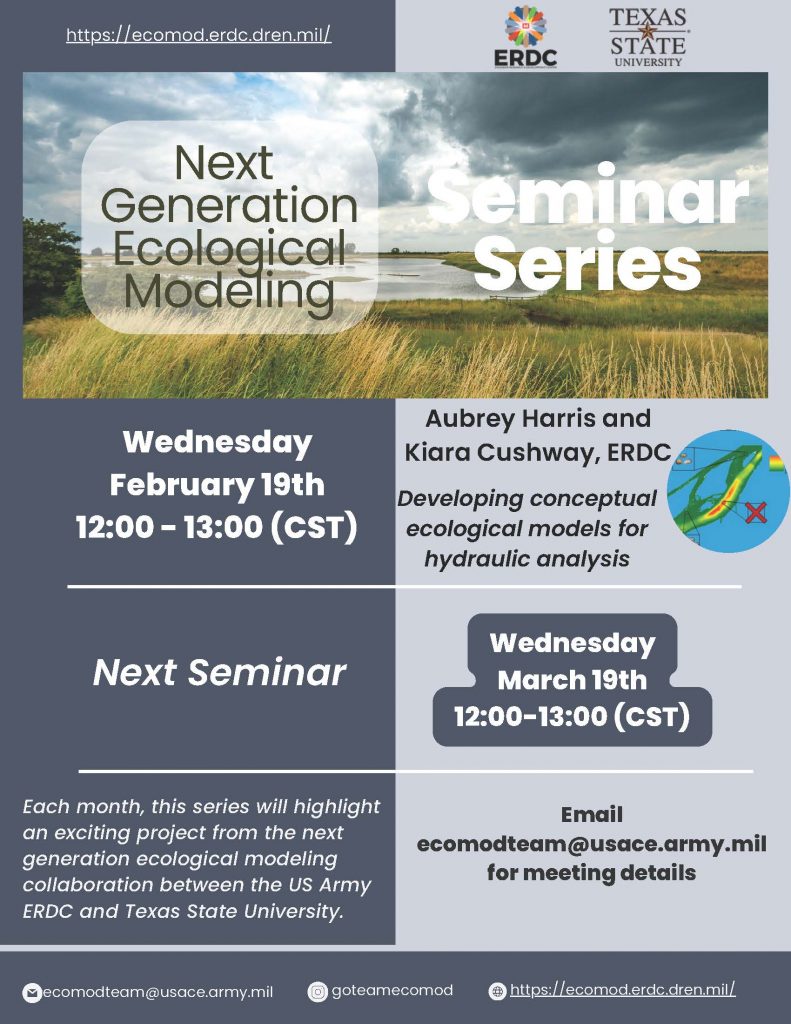
Check out NESSI: the new rapid assessment tool that uses machine learning to identify sites for beneficial use in dredged materials (BUDM).
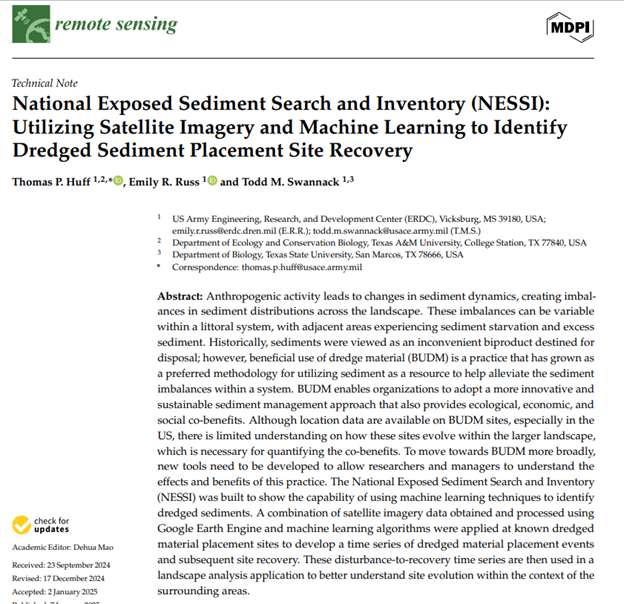
Discover a conceptual model that describes coastal marsh dynamics within the Chesapeake Bay. This model will assist in the development of a marsh management decision framework and was created with feedback from the virtual ‘Holistic Marsh Management Tool Workshop’, co-hosted by The Nature Conservancy (TNC).

This tech note addresses challenges USACE practitioners face regarding beneficial use of dredged materials (BUDM), as discussed during a virtual workshop led by Emily Russ.
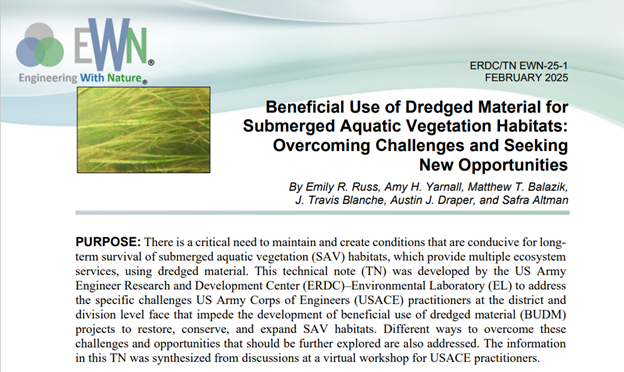
The Next Generation Ecological Modeling project has produced a new journal article discussing coding practices. This publication was a collaboration between ERDC and TX State University graduate students, highlighting our goal of advancing the use of modeling in ecological studies with the next generation of researchers.

A design charrette occurred October 29th and 30th in Freeport, Florida. This meeting brought together the USACE Mobile District and the non-Federal sponsor Walton County, as well as stakeholders from local, state, federal, and non-profit entities. Environmental Laboratory researchers Kyle McKay, Candice Piercy, Jacob Berkowitz, and Rosamar Ayala-Torres attended to provide ecological restoration expertise and to identify areas for scientific research.
Read more about this important planning session here.
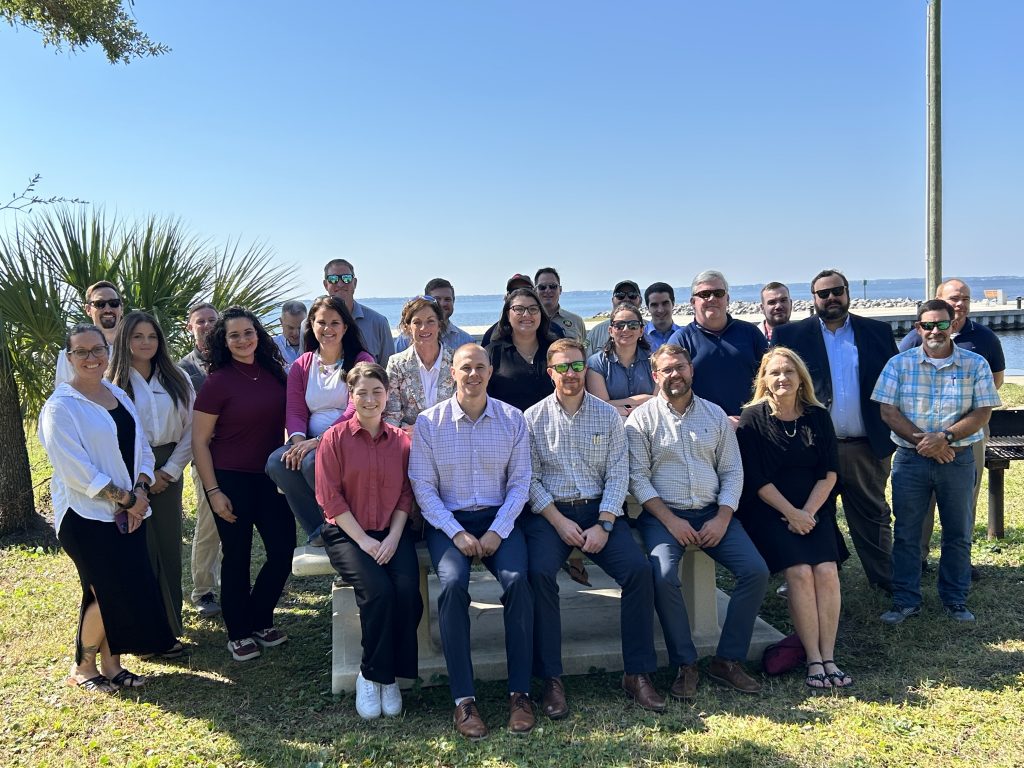
NEXT GENERATION MODELING SEMINAR
Join us for the 2024 Data Visualization Challenge Showcase! A panel of scientists and visual specialists reviewed the entries and we will announce our winners during the showcase.

This report demonstrates a new framework on a subset of wetland sites and local federal navigation channels in San Pablo Bay, California. This framework aligns dredging needs and beneficial use of dredged material (BUDM) placement opportunities by minimizing dredging costs and maximizing ecological benefits.

NEXT GENERATION MODELING SEMINAR
Iris Foxfoot will demonstrate the Floristic Quality Assessment tool! Floristic Quality Assessment (FQA) provides a standardized method of rapidly assessing the condition of a vegetated area based on the plant species that are present. Read more here.
Our collaborator Amanda Catlett, of the Information Technology Laboratory (ITL), brought the GenVeg project to the SciPy 2024 Conference is Tacoma, WA. SciPy is a community dedicated to the advancement of scientific computing through open-source Python software. Amanda was able to participate in tutorials and presentations while answering questions from fellow developers on how GenVeg modeling could be useful for their future research!
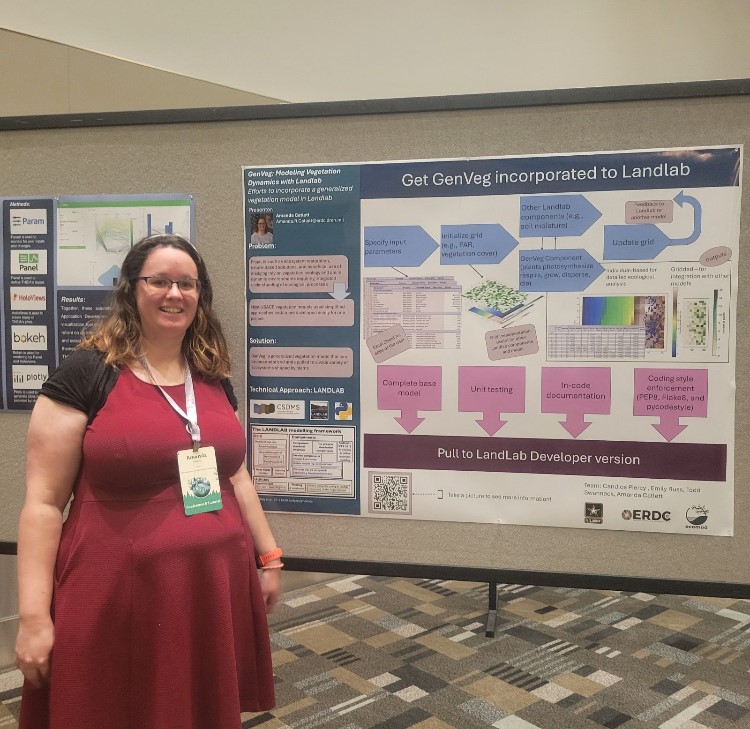
NEXT GENERATION MODELING SEMINAR
Hear from collaborators at Utah State University discuss studies of mussel reintroduction.
ERDC researchers from the Environmental Lab’s Integrated Ecological Modeling (EcoMod) and Water Resources Integrating Socio-Ecological and Engineered Systems (WRISES) teams presented on research and outreach topics at the American Ecological Engineering Society (AEES) 2024 Annual Meeting. Additionally, EcoMod’s co-lead, Dr. Candice Piercy, provided the keynote speech at the event. AEES is devoted to the promotion and scholarship of the emerging ecological engineering discipline.
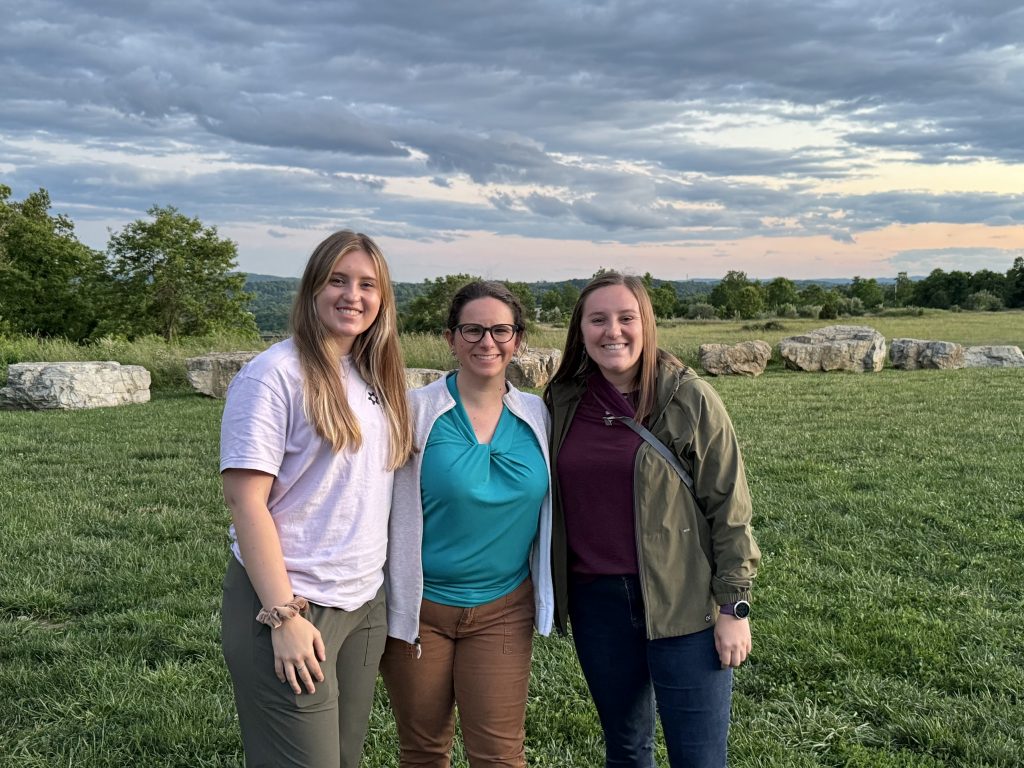
Drs. Candice Piercy, Todd Swannack, Emily Russ, and Thomas Huff of the Integrated Ecological Modeling Team (EcoMod), within the ERDC Environmental Laboratory, attended the Community Surface Dynamics Modeling System (CSDMS; pronounced “Systems”) Annual Meeting in Montclair, New Jersey on May 14-16. The meeting theme was “Coastlines, critical zones, and cascading hazards: Modeling dynamic interfaces from deep time to human time.” The CSDMS emphasizes community development, support, and dissemination of open-source code and software that advances our understanding of earth surface processes.


Team EcoMod, in collaboration with NOAA and USGS, presents a new publication entitled ‘Evidence on the ecological and physical effects of built structures in shallow, tropical coral reefs: a systematic map’. This article describes a literature review of worldwide manmade coral reef structures, along with drilling down on the specific components of the reef projects. Additionally, a systematic review method was detailed including a flow diagram and eligibility criteria. This research was funded through Engineering With Nature.

NEXTGEN ANNUAL COLLABORATION MEETING
Texas State University hosted the annual Next Generation Ecological Modeling (NextGen) meeting in San Marcos, TX. ERDC researchers from EL and ITL joined students and professors from partner universities including Texas State, Texas A&M, Utah State, Mississippi St., St. Catherine’s, and Central Michigan University. The meeting included 24 technical presentations as well as 11 student posters illustrating the progress on the computational modeling and data collection occurring for the Next Gen effort.
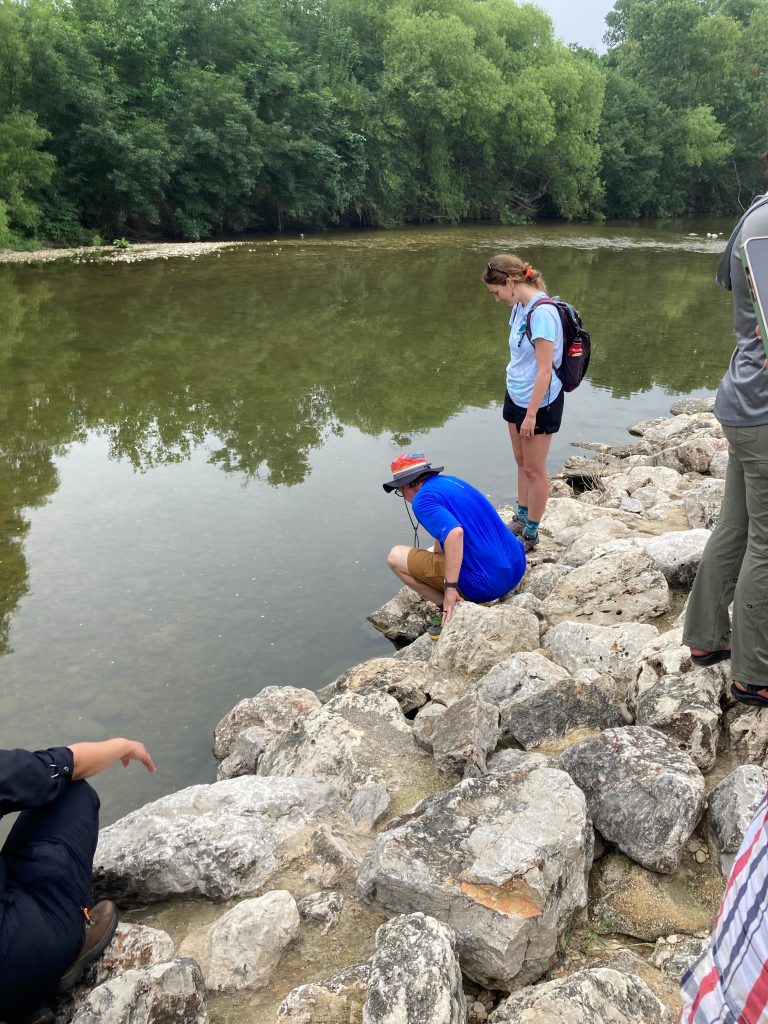

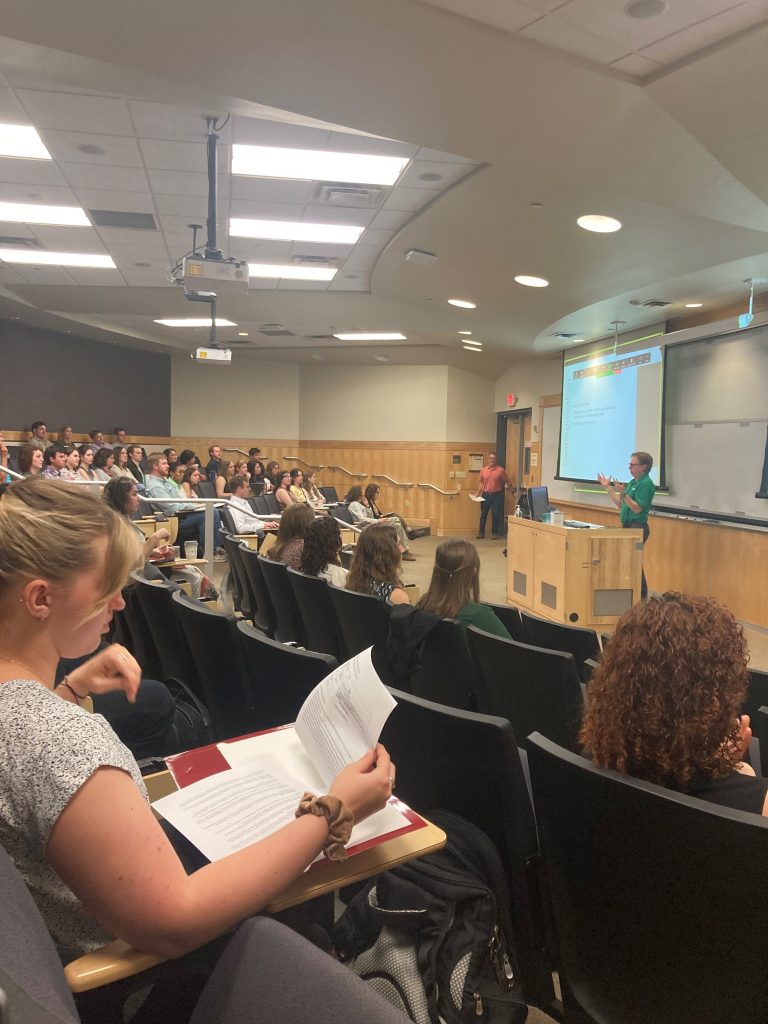
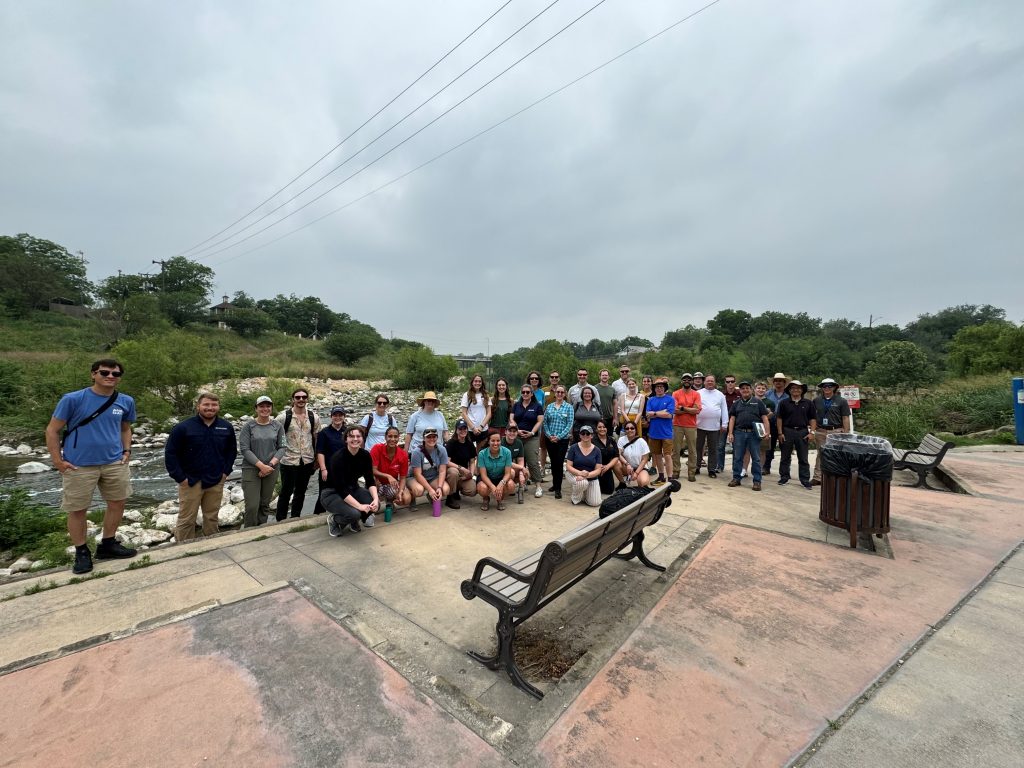
ECOMOD HOSTS DA FELLOW
Team EcoMod had the opportunity to host DA Fellow Rachel Rosenberg for the month of April! Her visit allowed her to check out all of ERDC and experience RD24. We asked her about the experience:
What led you to choose EcoMod for your outside-district rotation?
I wanted to come to ERDC to see the research and development side of the Corps mission, and the Environmental Laboratory was a clear fit for me. Scientific research is of great interest to me; it also informs many of the policies I implement as a regulator. I landed on the EcoMod team because of their unique approach and wide variety of topics. Dredged material placement, Living Shoreline functionality, freshwater mussel sampling, habitat suitability indices—these are just a few of the projects the team is currently working on. Ecological modeling allows researchers to make the most out of field and lab data, leveraging technology and brains to solve complex problems.
Favorite experience at ERDC (tour, project, etc)?
One of my favorites was getting to connect with entomologist Audrey Harrison at the Aquatic and Wetlands RDC. She gave me a personal tour of her lab space, showed me bugs under the microscope, and even gave me a case-building caddisfly to take home. We also discovered that I live a block away from her good friend in Baltimore – small world!
Best meal on your southern food journey?
It’s hard to choose but one of my favorites has to be the fried green tomatoes topped with crawfish etouffee at Klondyke.
